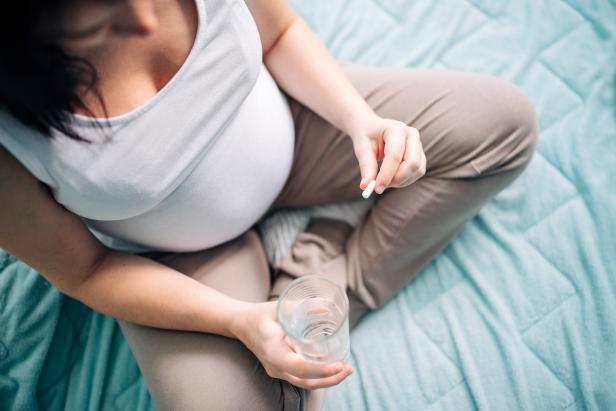Pregnant and Taking Antidepressants? Study Says Moms Don't Need to Worry About Neurodevelopment Harm
Great news for expectant moms!


Revolu7ion93
There’s a long list of medicines that are not safe to take when you’re pregnant. While previous studies have questioned the safety of expecting women taking antidepressants during their pregnancy, a new study has found no link between many common types of antidepressants and later risk of ADHD, autism, and other neurodevelopmental disorders in children.
According to the research published in the JAMA Internal Medicine Journal, researchers followed more than 145,000 women and their children for 14 years and what they found was women who took antidepressants during pregnancy did not impact their child's risk for neurodevelopmental disorders.
"Results of previous studies on this topic have presented conflicting results. Due to our large population size and careful study design, we believe that our study offers clarity that could help patients and providers make treatment decisions in pregnancy," says the lead author, Elizabeth Suarez, PhD, MPH.
She adds that these results can make a huge difference in the lives of expecting moms and women who want to get pregnant. "I believe these results are reassuring for patients. Our study provides robust evidence that antidepressant use in pregnancy is likely not impacting the child's risk for neurodevelopmental disorders."
Previous studies have shown an association between antidepressant use in pregnancy and certain conditions such as autism and ADHD. However, those studies were usually smaller and were also observational and didn’t show causation. Because of those studies, women often had to make the tough choice to go off their antidepressants during pregnancy or to not have children in order to stay on their medicine.
More than 13% of adults in the U.S. use antidepressants, according to data from the Centers for Disease Control and Prevention (CDC), and use is typically higher in women. In the past, women did not have a clear picture on how taking care of their mental health disorder could affect their child – that is until now.
Researchers are hopeful that this study will clear up confusion from previous studies and help moms-to-be feel comfortable and confident taking antidepressants if needed. In fact, not treating a mother’s mental health during her pregnancy can lead to devastating results such as preterm birth or stillbirth, growth and birthweight weight issues, and mom not being able to bond with her baby. The risk continues after the baby is born as well with postpartum depression and anxiety.
So, what can women do with this information? First, it’s very important to talk to your doctor about your mental health and any difficulties you may be facing. Remember, they are there to ensure you have a healthy pregnancy. Also, talk to your doctor about any medications you are taking, concerns you have about your medicine, and seek out a provider who specializes in perinatal mental health if you feel like you need more support during your pregnancy journey.
YOU MIGHT ALSO LIKE:















